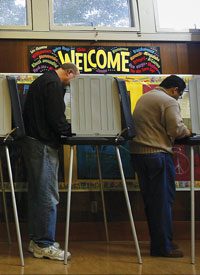
Skewed Results, Skewed Purpose
But Hannity has not been alone in decrying what many on both the left and the right see as efforts to skew the results of the next census for political advantage. The White House statement was issued after local Democratic officials and minority groups claiming they have been undercounted in past surveys protested the nomination of Republican Sen. Judd Gregg of New Hampshire as the next secretary of Commerce, the department that oversees the census. But word that members of the Obama team in the White House would be overseeing the process raised a red flag for Republicans fearful the count will be weighted in favor of Democrats when voting districts are realigned to reflect the new population figures. Though he later claimed it was only a “slight issue,” Gregg cited the controversy over the census as one of the reasons he withdrew from consideration as Commerce secretary.
Redistricting is only one of the political issues involved in the census count. The numbers will also affect the direction of hundreds of billions of federal dollars spent on roads, schools, water and sewer plants, and housing programs over the next decade. At the same time, some Americans have objected to what they regard as overly “intrusive” questions in previous censuses, and many have refused to fill out the questionnaire or answer questions for the census takers who come to their doors. In pleading for a full participation in the 2000 census, Ken Prewitt, then director of the Census Bureau, noted that the results “affect power money, group interests, civil rights, in short, who gets how much of what.”
In an interview with the New York Times, Prewitt said, “There’s not a single question on the census that was not put there to fulfill some very serious piece of legislation or government program…. If you think Head Start is invasive, if you think mass-transit routes are invasive, if you think the location of veterans hospitals is invasive, then maybe so, but they depend on the census.”
But determining “who gets how much of what” seems a far cry from an “enumeration” to determine the allocation of representation and direct taxation, as described in Article I, Section 2 of the Constitution. Apart from the question of the constitutionality of many federal programs that depend on census figures, there is the recurring issue of privacy that many Americans feel is violated by questions about where and for whom one works, work schedule, personal income, and even kitchen and bathroom fixtures in the home. Many Americans also resent being counted and classified according to race. “Does ‘human’ count?” one blogger said he wrote on his questionnaire.
Confidentiality Guaranteed … Not!
Federal law guarantees the confidentiality of census information, but confidentiality laws have often been breached for political purposes, as when secret FBI dossiers on hundreds of individuals turned up in the White House during the Clinton administration. As WorldNetDaily.com columnist Geoff Metcalf wrote about the 2000 census:
The same government that is unable to keep confidential FBI files confidential wants you to “trust” them. The same government that has routinely used the IRS to harass perceived political enemies and sends America’s young soldiers, sailors, airmen, and marines into harm’s way for political cover now wants you to tell all. After all, “We’re from the government and we’re here to help.”
That same “helpful” government has in recent years been listening in on our phone calls, imprisoning citizens for years without trial, and sending innocent foreigners on “extraordinary rendition” to overseas bases for torture. The government already knows, through the ubiquitous Internal Revenue Service, where and for whom you and every employed member of your household works and the names and ages of your dependent children. Through the decennial census and the bureau’s annual American Community Survey, you are also required to keep the authorities informed what time each of you goes to and returns from work, and the routes you take and the mode of transportation used. No doubt this information is useful for transportation planning and the allocation of federal taxpayer dollars for highway and mass-transit projects. But as John Whitehead of the Rutherford Institute has pointed out, such information could easily become an invitation to further invasions of privacy by a government grown increasingly hostile toward the guarantees written into the Bill of Rights.
“With the power of government agents under the USA Patriot Act to secretly come into your home and rifle through your personal belongings without a search warrant,” Whitehead wrote, “it is dangerous to let the government know when you will not be at home.”
The Past as Prologue: Never Again?
Most Americans are not used to thinking of our own government as a source of danger. We generally expect our government not only to provide order and security, but to protect our liberties as well. While census data, tabulated by IBM and its German subsidiaries, helped authorities find Jews, gypsies, and other “undesirables” and herd them off to labor camps in World War II, we assume nothing like that could ever happen here. But something like that did happen here. When President Roosevelt ordered the internment of Japanese Americans on our Pacific Coast, the Census Bureau was ready and willing to help, confidentiality laws notwithstanding.
According to some sources, Roosevelt requested the census data even before Japan’s attack on Pearl Harbor and America’s entry into World War II. In the next few months, similar data on German- and Italian-Americans would also be sent to the White House. But of the 110,000 Japanese Americans rounded up and imprisoned on the West Coast, two-thirds were citizens of the United States. They were not charged with nor tried for any alleged offense. Their crime was their Japanese ancestry.
Our government has since apologized for that injustice and, we might think, is unlikely to repeat it. Surely the United States today, with our greater sensitivity to civil liberties, would not imprison people because of their ethnicity. Perhaps. But some trends are not reassuring. We are at war again, this time with enemies in the Arab world. And Arab-Americans are suspect.
“The Census Bureau has provided specially tabulated population statistics on Arab-Americans to the Department of Homeland Security,” including detailed information on how many people of Arab backgrounds live in certain ZIP codes,” the New York Times reported on July 30, 2004. The ZIP code-level breakdowns sorted Arab-American populations by country of origin. “The categories provided were Egyptian, Iraqi, Jordanian, Lebanese, Moroccan, Palestinian, Syrian and two general categories, ‘Arab/Arabic’ and ‘Other Arab,'” the Times reported. Request for the data came from the department’s Customs and Border Protection Division, officials said, though it is not clear how information on people who are already here will help protect the borders. And that guarantee of privacy?
“We are required to provide information to other federal agencies,” explained Hermann Habermann, deputy director of the Census Bureau, who said such cooperation was standard practice. And the bureau does not have the authority to determine which agency will get what information.
“We do worry about how information will be used,” said Hermann. So should we all. When the Census Bureau began its annual survey in 2004, U.S. Rep. Ron Paul (R-Texas) called on the Congress and the American people to put an end to it. “The founders never authorized the federal government to continuously survey the American people,” said Paul. “More importantly, they never envisioned a nation where the people would roll over and submit to every government demand.”
Jack Kenny is a free-lance writer living in New Hampshire.
Photo: AP Images



